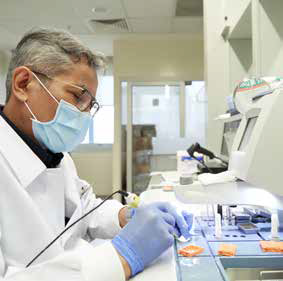<<Mr Senwan
Jamal prepares
tissue samples for
diagnosis in the
lab. Preparation
takes several
steps that include
fixing, staining,
cutting, and
sectioning.>>Major industrial
accident. Hotel
collapse. Virus
epidemic.
Singapore General Hospital
(SGH) Senior Medical Laboratory
Technologist, Mr Senwan Jamal,
has pretty much seen it all. So, as
far as he is concerned, working
amid the recent COVID-19
pandemic was business as usual.
The 67-year-old works in
SGH’s Department of Anatomical
Pathology, Division of Pathology,
preparing human tissue samples
for testing and analysis by
pathologists. Much of his working
life has been uneventful, but major
incidents like the 1978 Greek
tanker Spyros explosion and the
Hotel New World collapse in 1986
have left an indelible mark on him.
In those early days, forensics
came under the pathology
department’s responsibilities. The
lab staff worked hand in hand with
the pathologists. As pathologists
performed post-mortems, the
lab staff stood by and recorded
their findings. When the Spyros
explosion occurred, they had to
identify bodies, diagnose the
cause of death, and release the
information to the families,
Mr Senwan said.
“We were called back to work
— the men to the mortuary; the
ladies back in the lab. Because of
the scale of the disaster, there was
not enough space in the mortuary.
You could see bodies lying on the
floor, and all the freezers were full.
Families surrounded the mortuary,
waiting for their loved ones. Some
of them were crying. We worked
non-stop for two to three days,
even eating our meals at the
mortuary,” he added.
It was no different with the
Hotel New World collapse. “The
bodies came in, one by one, one
hour, three hours, the next day,”
he said, adding that the team had
to improvise by renting container
freezers to hold the bodies.
“Even the 2003 Severe Acute
Respiratory Syndrome (SARS)
epidemic was quite okay for us.
We kept to our standard operating
procedures (SOPs), wore N95
masks, goggles, gloves, T-shirts,
and track pants. I don’t think we
were extremely worried about
getting the disease,” he said.
 Lifelong passion
Lifelong passion
It almost seems like fate that
Mr Senwan should work in SGH.
He passed the hospital daily in
his teens, and often flirted with
the thought that he might some
day work at the hospital. When
he left school, Singapore had
just separated from Malaysia to
become a sovereign state.
“I saw an advertisement about
this job. This was my first choice
because I’ve always loved
biology and health science,” said
Mr Senwan, who has been in his
job for over 50 years.
When he received the SGH 50
Years Long Service Award in 2019,
he said his children were very
proud of him, even though they
had not realised he had worked at
SGH for so long. “When I went on
to the stage to receive the award,
it was a proud moment for my
family and me,” he added.
From infectious diseases to
national tragedies, Mr Senwan
took the many challenges that
came his way in his stride.
However, it is regular testing
work that gives him the
most satisfaction.
“Different patients have
different tissue. You have to think
about how to handle it, especially
problematic tissue that is very
tiny, for example. You must take
pride and do the testing work
properly,” he said.
Although he is already at
retirement age, Mr Senwan
believes in lifelong learning. “SOPs
change, and even at my age,
I keep abreast of the changes,
such as the use of computers and
information systems.”
“Healthcare is dynamic.
You can learn a lot and help
patients recover better. It is very
meaningful,” said Mr Senwan.
